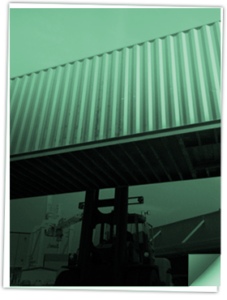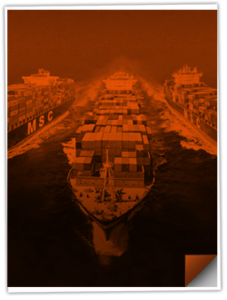Featured Headlines:
How To Live In Harmony In 2022
Shippers Need Expert Opinion For Exports
Port of Charleston Launches Clearance Sail
LA/LB Provides Decongestant for Pressure Relief
WTO Summit Organizers Say 'No-Go'
Shippers Hold Back Tears Amidst Omicron Fears
No Room to Maneuver in Vancouver
Air Cargo Rates Go Up, Up, and Away
Vessel Build Up Spreads Congestion
Carriers Swiftly Implement Blank Spaces
How To Live In Harmony In 2022
- The World Customs Organization (WCO) announced that the Harmonized System (HS) 2022 tariff nomenclature— which goes into effect on January 1st—is now available on its website.
- HS 2022 contains “significant changes” to the sixth edition, released in 2017, with 351 sets of amendments in total.
- WCO officials also added 2017 and 2022 correlation tables to the website to help assist importers with the changes.
Shippers Need Expert Opinion For Exports
- US legislators have asked the Federal Maritime Commission (FMC) to investigate accusations from exporters that the increased rates and lack of space and equipment from ocean carriers at certain ports has led to an “unreasonable denial of service” that favors US importers and is causing foreign customers to source elsewhere.
- Carriers admit that they’d rather not handle unprofitable cargo and instead shift the finger of blame towards record cargo volume, unprecedented rates and inefficient ports.
- US exporters claim that the trade deficit for agricultural goods will remain unbalanced and potentially expand if carriers continue to ignore exporters and prioritize more profitable shipments from overseas.
- The results from the FMC investigation will help determine whether or not legislators will approve proposed changes to modernize the Shipping Act of 1984.
Port of Charleston Launches Clearance Sail
- According to the South Carolina Ports Authority, the Port of Charleston is aiming to clear its backlog of anchored vessels by mid-December—which includes 2,000 containers still sitting after more than 30 days!
- One way officials plan on achieving this is by coaxing carriers and their customers to pick up older dwelling containers.
- They will also shorten the earliest receiving date on some exports from 10 days to 7 days.
- The Port will also temporarily allow additional gate moves each day to help make up for any delays incurred over the Thanksgiving holiday.
LA/LB Provides Decongestant for Pressure Relief
- Los Angeles—Long Beach terminals (LA/LB) temporarily adjusted the Traffic Mitigation Fee (TMF) effective December 1st.
- The new program will waive the usual TMF for nighttime moves performed after 6PM ($34.21/TEU) and double it for daytime moves ($78.23/TEU).
- Officials hope that the financial incentive will quickly motivate participants in the supply chain to shift their operations to off-peak gates and contribute to balancing port workloads while fighting crippling congestion.
WTO Summit Organizers Say 'No-Go'
- The World Trade Organization (WTO) postponed a scheduled summit this week due to Omicron fears.
- The primary objectives for the conference, now scheduled for next March, included vaccine trading deregulation, improved agricultural trade, and the broad empowerment of the WTO itself.
- This was bad news for the struggling airline and hotel industries— over 4,000 trade officials from 164 countries postponed their travel to the WTO headquarters in Geneva, Switzerland!
Shippers Hold Back Tears Amidst Omicron Fears
- Since early 2020, global shippers have witnessed extraordinarily wide-ranging governmental responses to Covid, and China’s zero tolerance stance has led to extreme port restrictions in Yantian and Ningbo, interior border crossing closures/quarantine delays, foreign seafarer prohibition on Chinese soil, and 7-week quarantines for returning Chinese seafarers.
- On the other end of the spectrum, vaccination rates in many developing countries are so low that factory production remains at high-risk exposure for future outbreaks; in particular, countries in SE Asia have struggled to vaccinate their populations.
- As the world watches Omicron spread, global shippers worry first about the medical response, but we must also closely watch the political, supply-side, and demand-side implications of Omicron. (And, it is increasingly obvious that Covid mutations are now a part of the global shipping calculus.)
No Room to Maneuver in Vancouver
- After more rain this week, British Columbia has closed 2 of the 3 main highways from Vancouver to truck traffic.
- Canadian Pacific and Canadian National rail service has shifted from “code red” to “code black” which essentially means that cargo is expected to dwell 7 days or more at port; Vancouver rail service is not expected to be back to normal until February, 2022.
- As reported previously, British Columbia was pummeled with heavy rainfall 2 weeks ago, resulting in unprecedented flooding and dangerous mudslides.
Air Cargo Rates Go Up, Up, and Away
- With airfreight volume up 9.4% globally and up 22.3% out of Asia (thank you long ocean transits during the holidays) while capacity is still down 7.2% (thank you Covid for lower passenger flight belly space), the trade witnessed the highest airfreight rates out of China in history.
- The average rates from all major Chinese gateway airports (Shanghai, Hong Kong, Shenzhen) sat between $17 and $20 per kilo with no expectation of diminishment until Chinese New Year.
Vessel Build Up Spreads Congestion
- While LA gets all the press, this week the ports of Ningbo and Shanghai had 175 containerships at anchor or at drift awaiting a berth.
- Speaking of LA, the number of ships at anchor was down 37% this week while the average size vessel waiting in the harbor was markedly higher, with over 50% carrying more than 10,000 TEUs.
- It was also revealed that ocean carriers are slowing vessel speeds in the Pacific to save fuel which means that LA is far from out of the congestion woods.
- As ocean carriers scramble to get their vessels in the right places, many are resorting to skipping ports of call in an attempt to recalibrate schedules; notably, Ningbo and Oakland have born the brunt of impromptu port omissions.
Beijing Newlympics
- Fortunately for global shippers, the 2022 Winter Olympics will occur during the annual Chinese New Year (CNY) celebration.
- Historically, Olympics held in China provoke several supply chain bottlenecks in the north of China, but the overlap with CNY should mitigate the shipping impacts.
- CNY will occur February 1-16, 2022, with the Olympics coming to Beijing February 4-20.
Carriers Swiftly Implement Blank Spaces
- Year-over-year Transpacific capacity to the US was reduced by 25.5% in 2021 YTD due to operational blank sailings by the ocean carriers.
- The carriers have announced that they will continue to implement blanks and remove vessels from rotation as long as port congestion realties continue to badly hinder schedule reliability.
- Global schedule reliability, historically between 75-80%, dipped beneath 30% in November.



